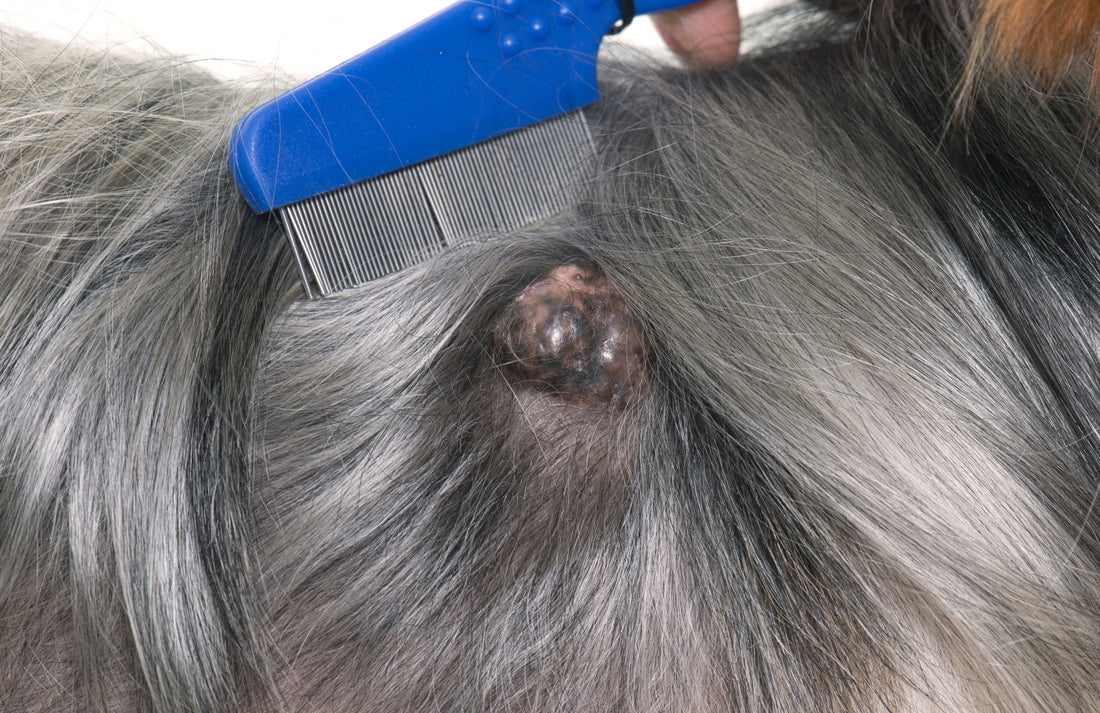
Things You Wouldn't Guess Cause Skin Cancer in Dogs
Share

Many of us love our canine friends like they're part of our family, and with good reason. Our dogs can provide love and companionship for well over a decade if we're lucky.
With that kind of bond, it only makes sense that we'd like to do everything we can to keep them healthy and fit, but it's not always easy. Dogs don't remember to look both ways when they cross the street, and they certainly don't mind drinking out of puddles.
That means in many cases it's up to you to keep them healthy. Skin cancer in dogs is more common than you might think, and there are a variety of reasons for it, some better known than others.
Types Of Skin Cancer In Dogs
First, let's talk about the different kinds of skin cancer in dogs, because different cancers may have different causes.
Melanoma
You've likely heard of malignant melanoma in humans, and unfortunately, our furry friends can get it as well. These cancers tend to develop around the mouth or feet, although a small percentage will occur on areas with fur.
Squamous Cell Carcinoma
This form of skin cancer may appear wart-like, and it occurs mainly around the abdomen, feet, or genitals. It's generally caused by exposure to the sun.
Mast Cell Tumors
The most common type of skin cancer in dogs, these appear as lumps that may become sores on the legs or body.
What Are the Causes?
So what exactly causes skin cancer in dogs? The causes aren't always what you might guess.
The Sun
For one thing, sunlight is a major factor in these cancers, just as it is for humans. Many people don't take the threat of the sun seriously when it comes to their dogs, mostly because they erroneously believe that the dog's hair or fur protects them.
It does, to an extent, but short-haired or light-haired dogs don't have as much protection as you might think, and all dogs have places on their body that aren't covered in fur, like their nose.
To protect your canine from excess sunlight, make sure that they have adequate shade from the sun while they're outside. Some dogs love to bask in the sun, but be sure that they have a place to retreat if it gets too warm.
There are also doggy sunscreens that you can buy to protect your pups. Remember to never use human sunscreen on your dogs, though. It isn't the same, and can be harmful to them if they lick themselves and ingest it.
Take a look at some of the protective vests or clothing that you can buy for your dogs. And remember that in the summer the asphalt and concrete on sidewalks and roads can pose a danger for your dog's feet. Take them out in the morning or evening when the surfaces are cooler.
Licking
This is a strange one, but excessive licking is thought to stimulate cell growth, which can then lead to mutations that cause skin cancer in dogs.
It's hard to keep your dog from licking all the time, but there are collars that can help prevent licking, as well as the dreaded cone of shame around their head.
Still, in the summer you can help reduce any irritation that causes licking by giving them oatmeal baths or simply cooling them down with a hose or spray.
Smoking
It's bad for the person smoking, and it turns out that it's bad for your pets, as well. secondhand smoke has been associated with oral squamous cell carcinoma, so it would be wise for owners to kick the habit–for themselves and their pups.
Genetics
This is a cause that most people don't typically think about when they start looking for a dog. Certain breeds are simply more susceptible to skin cancers than others.
For instance, Schnauzers and Scottish Terriers are more at risk for developing malignant melanomas.
Other breeds like Collies, Dalmatians, Basset Hounds, and Beagles are all at higher risk for squamous cell carcinomas. That makes sense if you remember that we mentioned squamous cell carcinomas are usually due to sun exposure. Those are all breeds with shorter and thinner coats.
Viruses
The papillomavirus can cause warts around the mouth of your dog, and it's also suspected of causing squamous cell carcinomas.
Prevention
You may have noticed that a lot of these seem hard to prevent. But a genetic predisposition for a certain type of skin cancer doesn't mean that your dog will get that skin cancer. It does mean, however, that you should be vigilant in looking for any mysterious lumps or bumps as your dog gets older.
- It also means that you should do what you can to keep them safe. Mostly that means mitigating the damage that they receive from the sun. If you do leave them outside during the day, make sure they have a cool, shady place to retreat to in the afternoon.
- And when it gets too hot for you to be outside for very long, remember that it's certainly too hot for your dog, too.
- If you have a short-haired breed of dog, look into the clothing and rash guards that are available for them to wear during the summer months when they're outdoors.
- Are you going on an extended adventure with your best pal? Then you may even want to check out the doggy goggles that provide 100% UV protection for their eyes.
- If you notice any cuts or sores, keep your dog from licking them with a cone or bandage, and have them checked out by your vet. Many skin cancers are initially misdiagnosed by owners as little cuts or injuries.
All in all, it can be difficult to prevent some skin cancer in dogs, but simple steps can keep them healthier, happier, and in your life for many more years.
And if your dog has already been diagnosed with skin cancer, know that there are different options for treatment other than just radiation or chemo. Yunnan Baiyao is a holistic treatment for your dog that can significantly help reduce internal bleeding without the undesirable side effects of other treatments.
So ask your vet about Yunnan Baiyao today to learn more about the different options for treating your dog's cancer.
